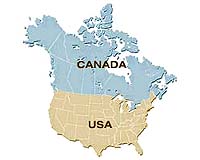| . |  |
. |
Oslo (AFP) Dec 6, 2009 Rising temperatures are causing the Arctic's ice sheets to melt, opening the door for an economic boom in the region but also posing a major threat to the survival of its indigenous peoples. The mercury is rising twice as fast in the Arctic as elsewhere, offering a frightening preview of what the future holds for the planet and prompting UN Secretary General Ban Ki-moon to describe the situation as "a canary in a coalmine." In what is the most visible effect of global warming, the melting ice cap shrank to a record low of 4.1 million square kilometres (1.58 million square miles) in September 2007. It risks disappearing entirely in the summer months by the end of this century, according to experts. "That's maybe even a bit optimistic given the latest observations, which suggest that the sea ice is melting even faster than expected," said Paal Prestrud, director of the Centre for International Climate and Environmental Research in Oslo (Cicero). The melting ice is opening up new shipping routes, such as the Northwest Passage off Canada and the Northern Sea route off Russia, which will dramatically shorten routes for ships sailing between the Atlantic and the Pacific, thus avoiding the Panama or Suez canals. The distance between Rotterdam and Yokohama will be shortened by as much as 40 percent, for example. Energy groups are meanwhile eagerly eyeing oil and gas riches under the seabed that have long been inaccessible because of the ice -- to the great dismay of environmental activists who fear oil spills in a fragile area. The region could be home to 90 billion barrels of oil -- worth a whopping 7.0 trillion dollars at the current oil price -- and 30 percent of the planet's untapped gas reserves, according to the US Geological Survey. The five countries bordering the Arctic (the United States, Canada, Russia, Norway and Denmark through its territory Greenland) have in recent years ramped up their territorial claims in the region, with Russia going so far as to plant its flag 4,000 metres (13,000 feet) beneath the North Pole. Their claims have occasionally overlapped, as is the case with Hans Island, a source of dispute between Denmark and Canada. But according to Frederic Lasserre, a geography professor at Laval University in Quebec, a new Cold War is unlikely. "There is very little chance that these countries will develop tense relations because of these climate changes," he said, noting that they have shown a willingness to resolve their differences through negotiation. "Most of the exploitable natural resources ... are located relatively close to their shores, so they are already in the countries' exclusive economic zones" recognised by the neighbouring nations, he added. Nonetheless, Russia and Canada have already decided to beef up their military presence in the Arctic. Just to be safe. "The Arctic is a very harsh environment," Canada's chief of defense staff, General Walter Natynczyk, said last month. "If someone were to invade the Canadian Arctic, my first task would be to rescue them," he said. While there may not be an armed conflict in sight, global warming has already claimed victims. It has dramatically changed the lives of the 400,000 indigenous people who live in the region and who depend on fishing and hunting for their livelihood. Ice that forms later in the year and melts earlier each year shortens the Inuits' hunting season. Some hunters have drowned, either caught off guard by thin ice or carried away by torrential currents. Others have had to slaughter their sleddogs because they can't hunt enough food to feed them. "We are people who not only survive, we thrive on the ice and snow," said Inuit activist Sheila Watt-Cloutier. Global warming is accelerated in the Arctic because of the concept known as reflexivity. Ice reflects more than 80 percent of the sun's radiation back into the atmosphere. When the sea ice melts, the dark water does not reflect the heat but instead absorbs it, thereby accentuating the effect of global warming. In Lapland, the alternating freezes and thaws make it harder for reindeer herders to shuttle their herds to winter pastures. And some species, such as barn owls, robins and mosquitoes, are moving further north into new habitats. "The native species now find themselves competing with the new arrivals for survival, and they themselves can't flee further north," Prestrud explained. Even the king of icecap -- and the food chain -- is at threat. By 2050, two-thirds of the Arctic's 20,000 to 25,000 polar bears could disappear because of the melting ice, where the bears hunt seals, according to experts. They have also observed a rise in cases of cannibalism, attributed to the polar bears' difficulty finding food. Share This Article With Planet Earth
Related Links Beyond the Ice Age
 US, Canada seek warmer ties on Arctic
US, Canada seek warmer ties on ArcticHalifax, Canada (AFP) Nov 20, 2009 US Secretary of Defense Robert Gates on Friday said Washington aims to boost cooperation with Canada in the Arctic, as Russia and others eye its vast untapped resources. "Canada and the US are both Arctic nations," said Gates. "We share an interest in developing more icebreaking ships for mobility and improving domain awareness to support search-and-rescue in light of increased tourism up ... read more |
|
| The content herein, unless otherwise known to be public domain, are Copyright 1995-2009 - SpaceDaily. AFP and UPI Wire Stories are copyright Agence France-Presse and United Press International. ESA Portal Reports are copyright European Space Agency. All NASA sourced material is public domain. Additional copyrights may apply in whole or part to other bona fide parties. Advertising does not imply endorsement,agreement or approval of any opinions, statements or information provided by SpaceDaily on any Web page published or hosted by SpaceDaily. Privacy Statement |